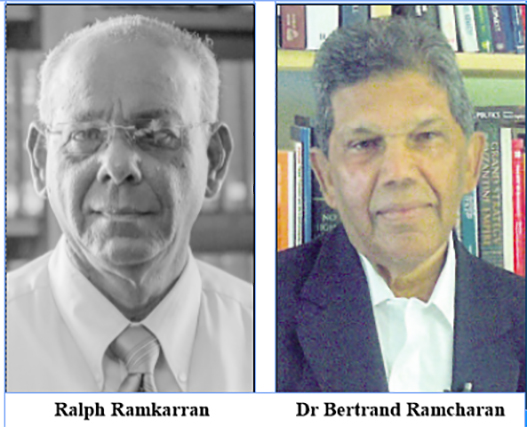Former Speaker of the National Assembly, Ralph Ramkarran has rejected the view espoused by former Chancellor of the Uni-versity of Guyana, Dr Bertrand Ramcharan that shades of autocracy are evident here.
Writing in his column in the September 1st Sunday Stabroek, Ramkarran disagreed with the contention by Ramcharan that Non Governmental Organisa-tions (NGOs) have been vilified by this government and that this was a sign of autocracy.
Ramcharan said in an August 27, 2024 column in this newspaper: “In Guyana, we have recently seen official inquisitions into the tax status of NGOs, calls for new laws to ‘regulate’ NGOs, and public campaigns of vilification against particular NGOs and their leaders. There are shades of autocracy here, without a doubt. And Guyana has also seen ‘highest level’ admonitions of judges carrying out their duties in good faith”.
He promulgated the view in discussion of the book, Auto-cracy Inc. by Anne Applebaum.
Ramkarran disagreed and said: “There is no vilification of NGOs of which I am aware. A few are sharply criticized and accused of having political agendas. Those criticisms are responses to NGOs. Where it is perceived that NGOs are motivated by political bias, not all being pristine pure, the Government calls them out. In relation to the judiciary and magistracy, there have been criticisms by political figures on two occasions within the past eighteen months and several by the Attorney General. In no case was the decision of the judicial or magisterial official challenged on the basis that it was politically biased or motivated. These few and scattered events do not invite a sense of impending doom of NGOs or their independence and that a judiciary that frequently rules against the perceived interests of the Government, feels constrained. It should be noted that Dr. Ramcharan made no claim that freedom of the press is under assault or that Parliament is being subverted. Attacks on press freedom or parliamentary democracy are the first signs of attempts to establish autocratic rule. These among the first institutions that come under scrutiny when autocrats are on the move”.
Ramcharan had contended that there are other shades of autocracy here. He said that parliamentary scrutiny of governmental activity is minimal, if at all and governmental consultation with the opposition is hardly existent.
“Oil money has made the Government lush with funds for information campaigns. And an Oracle in the ruling party pronounces on all matters, big and small. The spirit of governance smells of autocracy”, he contended. His citing of an oracle is seen as a reference to Vice President Bharrat Jagdeo.
Ramcharan had also posited that in the coming global struggle between Autocracy Inc. and Democracy Inc it would help Guyana to navigate its way inside Democracy Inc. “if we could negotiate a new system of governance that would give every Guyanese a sense of belonging, or ownership, of their system of Governance”.
He said that so far no leader of any of the political parties has been able to rise to this challenge of leading the country to a system of governance “in which every Guyanese would feel that she or he has a stake. And none of the leading parties has thus far risen to this challenge”.
He asserted: “Until Guyana succeeds in devising a trusted system of governance, it will remain precariously poised between democracy and autocracy, with vibes of autocracy manifesting themselves in the governance of the country”.
Ramkarran in his response on this point said that Guyana’s political condition is characterized by the struggle for ethno-political dominance, not a struggle for inclusive governance or shared governance.
“There is not now, and has never been, any widespread campaign or popular support for inclusive or shared governance by the supporters of either of the major political parties or the public. The promotion of inclusive or shared governance has always been merely efforts initiated by political elites of both main political parties, and hangers-on like myself, save that the PPP adopted such a policy in 1977 but abandoned it in 1992 and APNU+AFC did the same for the 2015 elections but likewise abandoned it immediately after”, Ramkarran argued.
In the circumstances, he said that the failure to implement inclusive or shared governance can hardly tag Guyana with “shades” of autocracy or being in the netherworld between autocracy and democracy.









